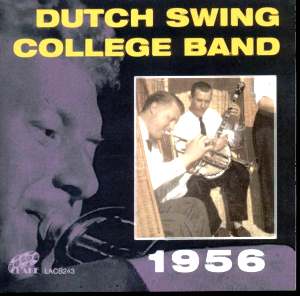New Orleans Stomp
When It’s Sleepy Time Down South
Where’s My Heaven
Creole Belles
Three Little Words
The Last Time
Some Of These Days
Two-Nineteen Blues
I Ain’t Got Nobody
Am I Blue
Kansas City Stomp
Bob’s Blues
Knee Drops
St. Louis Blues
I’m Coming Virginia
Come Back Sweet Papa
Neva Raphaello (vocals)
The Dutch Swing College Band
rec. 1956
This is another of Lake’s
releases devoted to a specific year. It captures
the DSC Band in 1956 in an album originally
issued under the LP rubric Jazz at the
Seaport. This was actually in Rotterdam,
at the Grote Schouwberg, a capacious theatre
that was packed for the two evenings of live
recordings eventually issued on LP and 7"
EP. Here they are now, tastily transferred
to CD.
As a result there’s a lot
of audience participation. That endemic hazard
of the live gig, prolonged after-solo applause,
inevitably means that the purist will be denied
the next couple of bars of the ensuing solo.
But the gains are those of spontaneity and
adrenalin-fuelled verve. The disc showcases
both the strengths of the band – assimilation
of models and a definite dynamism – and also
its limitations, which included a certain
leaden approach to aspects of the repertoire.
New Orleans Stomp
gives us the former with its brisk and snappy
take fuelled by audience approbation. Armstrong
was the primary influence on Wybe Buma and
Bechet on clarinettist and soprano saxophonist
Dim Kesber. On Where’s My Heaven we
are treated to a fine and swinging intro from
pianist Joop Schrier. But that revivalist
stand-by Creole Belles reveals a turgid
and galumphing approach to Ragtime. Influences
also include the swing era – there’s an approximation
of a Goodman riff in Three Little Words,
not inappropriately so.
Singer Neva Raphaello joins
the band for four tracks. Annotator Mike Durham
is not enamoured of her. It’s true that the
temperature drops; the band certainly retreats
to a rather conventionally supportive role.
She sang quite widely – doing some sides with
Lyttelton amongst others – and her singing
is certainly passable. Once freed of these
constraints we can hear the DSC’s full-on
Lu Watters feel in Kansas City Stomp and
especially in Come Back Sweet Papa – where
we can note the two cornet front line of Buma
and André Westendorp.
Enjoyable rather than essential
I’d say but the DSC’s many admirers will relish
the thought of consolidating their old vinyl
in this way.
Jonathan Woolf
